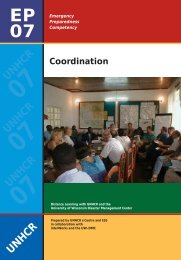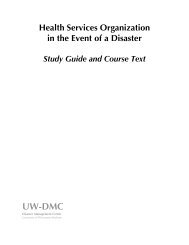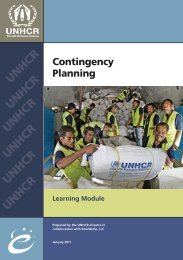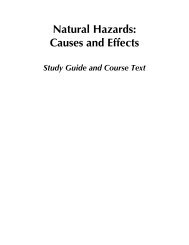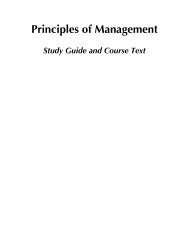Managing External Relations - Disaster Management Center ...
Managing External Relations - Disaster Management Center ...
Managing External Relations - Disaster Management Center ...
You also want an ePaper? Increase the reach of your titles
YUMPU automatically turns print PDFs into web optimized ePapers that Google loves.
Chapter 4<br />
Be interesting—If you have a very limited time for your presentation, you will need to demonstrate<br />
your commitment and get people’s attention quickly. Clear delivery, well written material, and a<br />
high level of energy will make any presentation more interesting and persuasive. Your style can also<br />
make your presentation interesting. Be direct—use eye contact and a clear, crisp voice. Avoid long<br />
sentences and look up at the end of a sentence.<br />
Working with the Media<br />
Even if you have newsworthy stories, media groups do not always use the information you give them<br />
as you would like. Friction with the media, however, is usually not productive for UNHCR’s publicity<br />
purposes.<br />
You can work effectively with the media by learning their ground rules and ensuring that they<br />
know UNHCR’s ground rules as well. Especially in emergencies when time is your most precious<br />
commodity, you must set the rules/norms by which you give time to journalists or other media<br />
representatives. It is also important to know the preferences of the journalists you are working with,<br />
and to cultivate relationships with journalists and television interviewers that you trust. Media ground<br />
rules may include:<br />
♦ The best way to contact media people—in person or by phone, fax, or email<br />
♦ How much notice they need and their deadlines for publication<br />
♦ Requirements for press releases or photographs<br />
♦ The procedure for correcting or addressing mistakes<br />
♦ What they look for in a story or what their audience wants<br />
♦ How to behave while on the ‘set,’ such as not smoking, etc.<br />
UNHCR Ground Rules for the Media<br />
UNHCR staff need to know who at UNHCR is in charge of handling relations with the media. Having<br />
one person responsible for contacting the media makes it easier to develop working relationships<br />
and credibility with journalists. At times, however, it will be appropriate for different staff to respond<br />
to the media, so the responsibility for certain queries and interviews may fall into the hands of several<br />
people. For example, the media may go the refugee site unannounced and expect a briefing from<br />
field officers regarding the current unfolding emergency. The Public Information (PI) or media officer<br />
can help to ensure that both UNHCR and media ground rules are understood and followed by staff.<br />
Reporters and correspondents generally respect UNHCR’s ground rules for interviews. These<br />
ground rules should be clearly established in advance of an emergency. Some basic rules regarding<br />
attributing statements to UNHCR are:<br />
♦ If the interview is intended for full attribution, the interviewee can be quoted<br />
by name verbatim or indirectly.<br />
♦ If an interview is given to provide background information, what the interviewee<br />
says cannot be directly attributed to him/her.<br />
♦ It is important to agree in advance with the media on the attribution, for example,<br />
‘a UNHCR spokesperson,’ ‘UN sources,’ ‘a humanitarian worker,’ or ‘ sources in the<br />
international community,’ among others.<br />
♦ It may be necessary to declare what parts of an interview are for attribution.<br />
For example, facts may be quoted but political considerations and constraints may not.<br />
♦ Recorded or live radio and TV interviews are by definition fully attributable.<br />
EP<br />
04<br />
61



